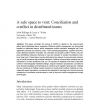Free Online Productivity Tools
i2Speak
i2Symbol
i2OCR
iTex2Img
iWeb2Print
iWeb2Shot
i2Type
iPdf2Split
iPdf2Merge
i2Bopomofo
i2Arabic
i2Style
i2Image
i2PDF
iLatex2Rtf
Sci2ools
126
click to vote
ECSCW
2007
2007
A safe space to vent: Conciliation and conflict in distributed teams
: This paper considers the nature of conflict in relation to the environments within which distributed teams cooperate. Effective conflict management can bring great benefits to distributed teams, while inadequate conflict resolution strategies can incur significant personal and resource costs. The increased geographical, cognitive and emotional distances between members can stimulate and amplify conflict. Parties may display disinhibited behaviour (flaming) or may be reluctant to accept reconciliatory overtures (low trust). These factors can be attributed to the impact of communication technology on social structures that underlie interaction. Shifting to face-to-face meetings can be impractical or involve prohibitive cost, so it is important to establish how best to deal with conflict in technologically-mediated settings. Dispute resolution practitioners (conciliators) have evolved strategies and techniques to construct and regulate "safe-spaces"; settings that are conduciv...
Conflict Management | ECSCW 2007 | Effective Conflict Management | Inadequate Conflict Resolution | Software Engineering |
| Added | 29 Oct 2010 |
| Updated | 29 Oct 2010 |
| Type | Conference |
| Year | 2007 |
| Where | ECSCW |
| Authors | Matt Billings, Leon Adam Watts |
Comments (0)

